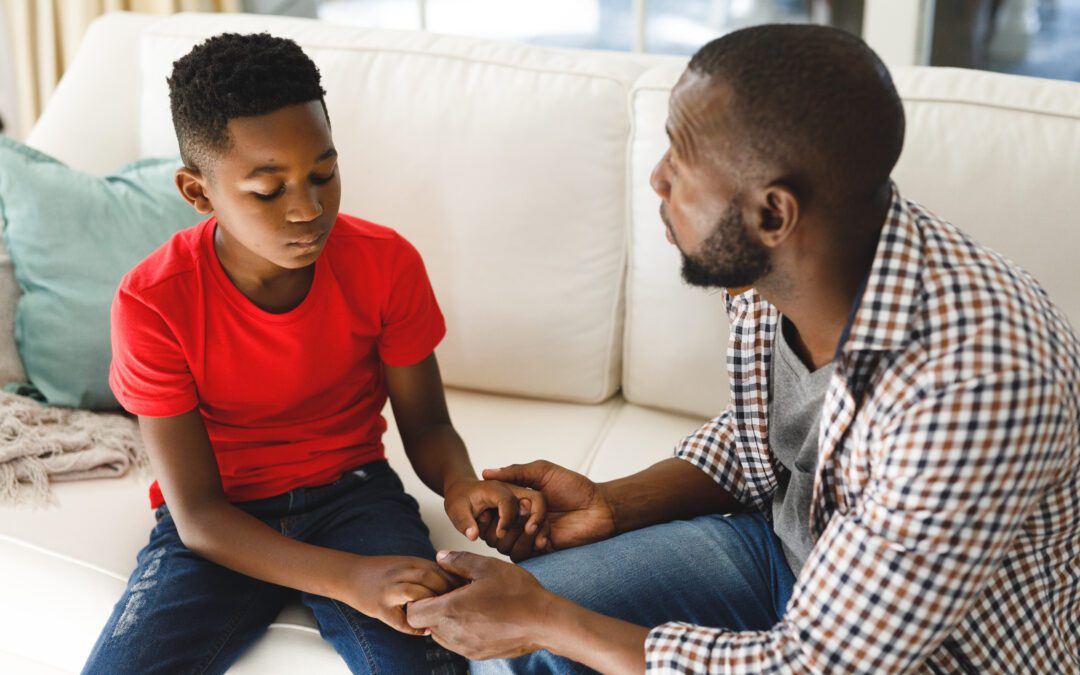In our increasingly interconnected world, young people have unprecedented access to news and information concerning global conflicts, including those from the ongoing conflict in Gaza. These graphic images and videos can make these events feel closer and more real than ever before. As parents, we find ourselves navigating these harrowing events together and searching for ways to facilitate conversations about war and violence with children while also recognizing the toll these events have on their mental wellbeing. Here are some ways you can support your child during this time:
- Be the one to start the conversation
A proactive parent is a prepared parent, so start the conversation. Your child has probably already heard about the conflict from their classmates or read or watched footage on social media or online. They likely have some questions. Don’t just sit back and wait for them to come to you.
A good way to start the conversation is by asking “curiosity questions”. These are open-ended questions that can easily start a deeper conversation.
Some examples of curiosity questions are:
- Have you heard about what’s going on in the world?
- Do you know about what’s happening between Israel and Palestine?
- What are you hearing at school?
Let them answer and then take the conversation to deeper topics from there.
- Scroll social media with your child
If your child is old enough to have their own social media accounts, take time to know what they are exposed to and the accounts they follow. While this may raise concerns about privacy, it’s important to clarify that your intention is not to invade their space but to foster a dialogue about global events. Scrolling through your teen’s social media feed together allows you to react in real-time and discuss the content. It also provides the opportunity to gauge whether the content is suitable for their age and maturity level. You can use parental controls to block inappropriate content if needed.
- Limit news coverage
Exposure to violent imagery can impact your child’s mental health, potentially causing anxiety, fear, and even trauma. The relentless bombardment of distressing images and stories can lead to increased anxiety, persistent fear, and even trauma, particularly in developing minds. Young people are more vulnerable to the emotional toll of continuous exposure to such content, making it important to strike a balance between staying informed and safeguarding their mental wellbeing. Recognizing the potential harm and taking proactive steps to limit news consumption is a crucial aspect of supporting your teen’s emotional resilience and ensuring their overall mental health remains intact during times of global turmoil.
Ways to limit news coverage:
- Set specific time limits for news consumption.
- Choose reputable and balanced news sources to avoid sensationalism.
- Encourage alternative activities, such as hobbies, exercise, or spending time with family, to create a healthy balance.
- Consider designating news-free zones or times, like at the dinner table or before bedtime.
- Be aware of misinformation
The prevalence of misinformation on social media is a growing concern. Some users share false claims about conflicts, doctor images, or use misleading captions. To ensure your child is viewing accurate information, guide them to trusted news sources and teach them how to recognize and verify reliable information. Fact-checking websites like Snopes can be valuable resources for confirming the accuracy of content they encounter.
- Be honest with your own knowledge
Geopolitics is a complex topic, and unless you’re a politician or a journalist, you’re likely not an expert in the field. That’s fine! You’re not expected to be. What’s important is that you acknowledge your knowledge (or lack thereof) with your child. They might have been reading up on the subject and know as much — or more — as you do. Share what you’ve learned with each other. Open a discussion. Bond with your child and learn about the world together.
With all that is happening in the world, it’s important for parents to take an active role in helping young people navigate discussions about war and violence. By discussing current events and monitoring their exposure to violent news coverage, you can help support your child’s wellbeing as they gain a balanced understanding of the complex issues our world faces.
